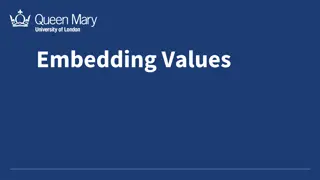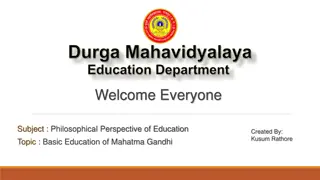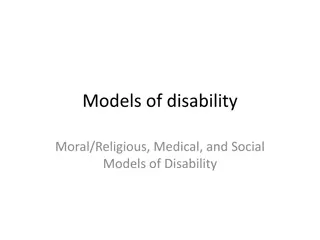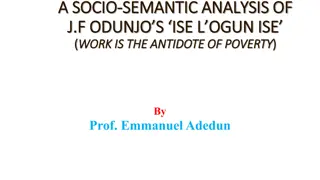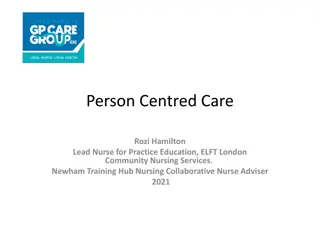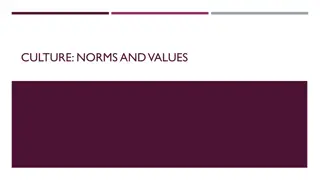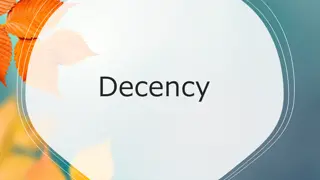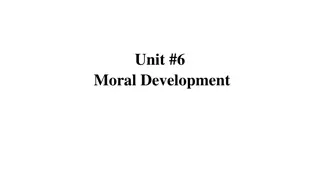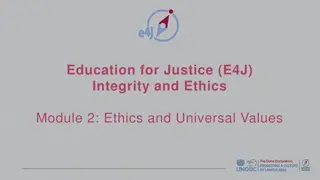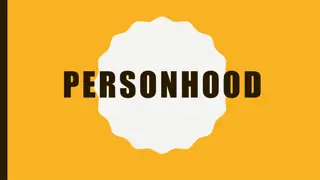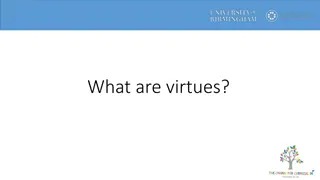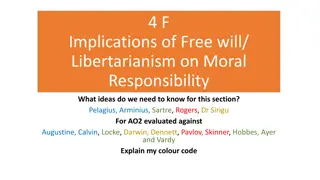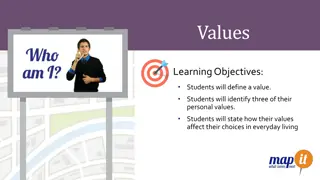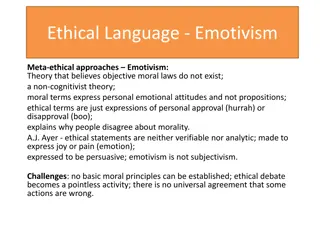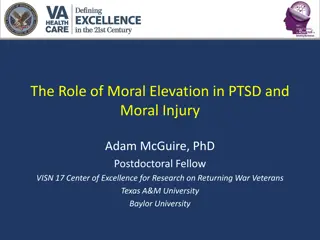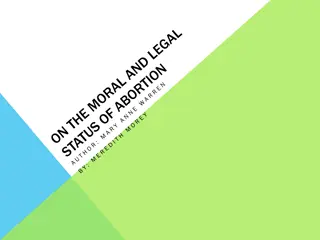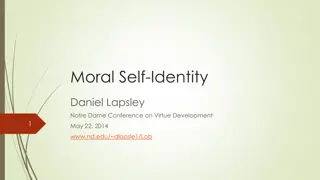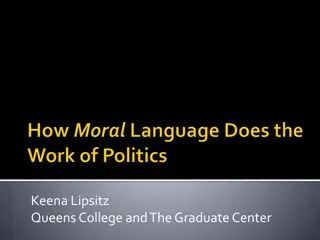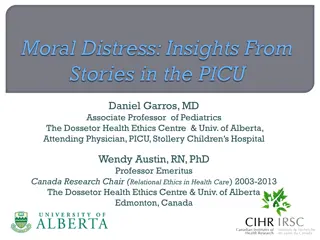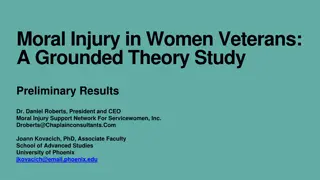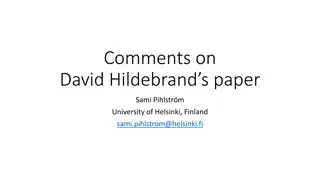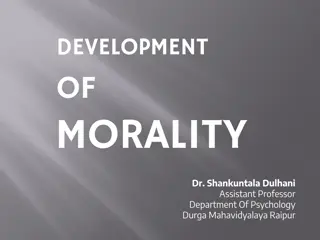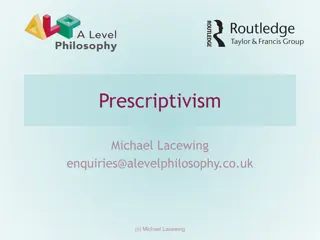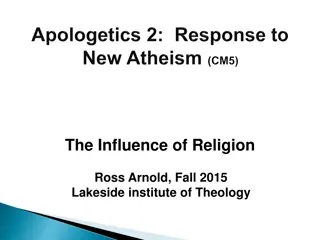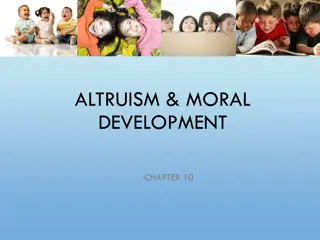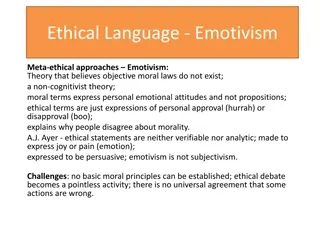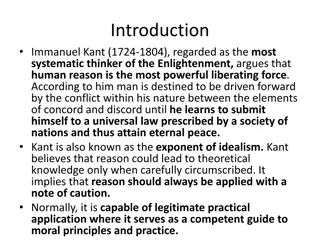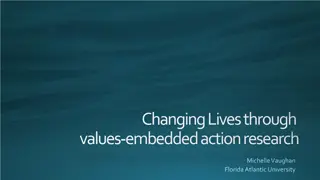Uncovering the Violent History of Capitalistic Enclosures
Explore the historical context of capitalist enclosures, their violent impacts on peasants, and the moral justifications used to conceal these atrocities. Delve into how economic narratives created moral bubbles to justify violent acts, as examined through the lens of Marx's analysis. Unveil the par
1 views • 11 slides
Implementing Our Values in Action Toolkit for Team Development
This toolkit focuses on utilizing Our Values in action within teams at Queen Mary to reinforce positive behaviors and create a supportive work culture. Managers are encouraged to lead discussions, allocate work based on values alignment, incorporate values in 1-to-1 meetings, and plan for a Values A
5 views • 19 slides
Durga Mahavidyalaya
Education is viewed as the acquisition of knowledge, skills, beliefs, and moral habits. Mahatma Gandhi introduced his Basic Education concept emphasizing free and compulsory education, mother tongue instruction, craft-centered learning, moral education, and character building. The curriculum include
0 views • 6 slides
Understanding Models of Disability: Moral, Medical, and Social Perspectives
The concept of disability is explored through moral/religious, medical, and social models. Impairment refers to a loss or abnormality in structure or function, while disability is a restriction in performing activities. The discussion also delves into the significance of person-first language and th
1 views • 35 slides
Growing Careers for Positive Change: Aligning Actions with Values
The lesson focuses on helping individuals align their actions with their values, emphasizing the impact of intrinsic and extrinsic values on personal wellbeing and decision-making. Through activities like Diamond 9 Values, students explore the importance of values in career choice and relationships,
1 views • 15 slides
Socio-Semantic Analysis of J.F. Odunjo's "Ise L'ogun Ise" and Yoruba Cultural Values
Societal values, cultural identity, and the impact of linguistic forms on social meaning are explored in this study. Through an analysis of J.F. Odunjo's poem "Ise L'ogun Ise" and Yoruba socio-cultural values, the study aims to address the decline in moral standards and societal ethos, advocating fo
0 views • 35 slides
Understanding Values, Beliefs, and Personal Values in Everyday Life
Our values and beliefs shape how we think, act, and make decisions in everyday life. Whether conscious or not, they influence our behavior and attitudes. This article explores the definitions and importance of beliefs, values, and personal values, highlighting how they impact individual decision-mak
0 views • 27 slides
Understanding Cultural Norms and Values
Sociologists define culture through norms, values, beliefs, and material objects. Norms are rules that govern behavior, with three basic types: folkways, mores, and laws. Folkways are customs without moral significance, mores are norms with moral importance, and laws are clearly defined and enforced
0 views • 15 slides
Cultivating Decency and Moral Excellence in Daily Life
Embrace a life of decency and moral refinement through moderation, purity, and vigilance. Uphold virtues of modesty, temperance, and clean-mindedness in all aspects of existence, fostering an environment of respect and dignity. Strive to elevate your character towards the divine, embodying qualities
0 views • 18 slides
Understanding Kohlberg's Stages of Moral Development
Kohlberg's stages of moral development, built upon Piaget's psychological theory, outline six developmental stages of moral reasoning, with each stage offering a higher level of response to moral dilemmas. Kohlberg focused on justice in moral development and emphasized the importance of how individu
0 views • 19 slides
Understanding Moral Development and Moral Reasoning
Moral development involves an individual's sense of right and wrong, influenced by family, school, friends, and societal environment. Children learn moral concepts from interactions with parents, teachers, peers, and society, shaping their understanding of good and bad. Additionally, moral reasoning
0 views • 13 slides
Understanding Ethics, Values, and Universal Morality
Explore the concepts of ethics, universal values, and morality in a multicultural context through Education for Justice (E4J) Integrity and Ethics Module 2. Delve into topics such as the Universal Declaration on Human Rights, enacting universal values, moral relativism, and more. Gain insights on th
6 views • 14 slides
Understanding Personhood: Philosophical Perspectives on Moral Consideration
Exploring the concept of personhood involves delving into what it means to be part of a moral community and deserving of moral consideration. Various criteria, from genetic to cognitive and social, are discussed, shedding light on the complex debates surrounding animal rights, abortion, euthanasia,
0 views • 10 slides
Understanding Virtues and Practicing Ethical Behavior
Virtues, such as resilience, compassion, and integrity, represent moral excellence. Practicing virtues leads to a good life, according to Aristotle. By understanding virtues like gratitude and reasoning, individuals can cultivate a sense of moral responsibility and ethical behavior. The concept of t
0 views • 8 slides
Moral Responsibility and Free Will Implications in a Contemporary Context
This text delves into the implications of free will and libertarianism on moral responsibility, examining the ideas of various philosophers and thinkers such as Pelagius, Arminius, Sartre, and more. It explores the concepts of moral agency, determinism, normative ethics, religious beliefs, and the c
5 views • 12 slides
Exploring Personal Values in Everyday Life
Discover the importance of values in decision-making and personal development. Engage in activities such as identifying personal values, ranking their importance, and creating a self-identity puzzle. Understand how values influence choices and relationships. Connect values to career decisions and fi
0 views • 9 slides
Understanding Emotivism in Ethical Philosophy
Emotivism is a meta-ethical theory that rejects objective moral laws, instead positing that moral terms express personal emotional attitudes, not universal truths. Influenced by A.J. Ayer and rejecting naturalism, this theory suggests that ethical statements are not objective propositions but rather
0 views • 28 slides
Ethical Decision Making in Clinical Practice: Understanding Dilemmas and Solutions
An examination of ethical decision making in nursing, focusing on defining ethical dilemmas, addressing moral distress, and exploring the purpose of nursing ethics. The importance of aligning personal and professional values, ethical principles, and laws in resolving ethical dilemmas is discussed, a
0 views • 8 slides
Challenges and Opportunities of Moral Revolution in Indonesia
The need for a moral revolution in Indonesia to address societal issues like corruption, conflict, and intolerance. Contrasting mental and moral revolutions, the focus is on behavior change to build a humane society with healthy moral values. Initiatives and discussions highlight the urgency of tran
0 views • 13 slides
Understanding Moral Elevation in PTSD and Moral Injury
The research by Dr. Adam McGuire explores the role of moral elevation in PTSD and moral injury, emphasizing how witnessing virtuous behaviors triggers emotional and physical responses leading to a desire for imitating virtuous acts. By integrating prosocial emotions into trauma treatment, the positi
0 views • 13 slides
Exploring Values Education in Nordic Preschools
This study delves into the perception and handling of values in Nordic preschools, focusing on caring, disciplinary, and democratic values. It aims to uncover whether conflicting or co-existing values prevail within individual preschools and across Nordic countries. Definitions of values, including
0 views • 16 slides
Understanding Humanity and Moral Community in the Context of Abortion Ethics
Exploring the complex ethical considerations surrounding abortion, this discussion delves into determining the humanity of a being, defining the moral community based on traits of personhood, fetal development, and the right to life. The arguments include the morality of abortion, the definition of
0 views • 9 slides
Challenges to Moral Anti-Realism: Objections and Responses
The article explores objections to moral anti-realism, including moral nihilism, condemning immorality, and the notion of moral progress in the absence of moral reality. It addresses concerns about the justification for interfering with others' behavior, the relationship between moral beliefs and ob
0 views • 6 slides
Understanding Moral Self-Identity Development
Situating moral self-identity within ethical theory and developmental psychology, this overview explores the centrality of morality within the self-concept. It discusses the chronic accessibility of moral schemas, the importance of strong evaluation in moral behavior, and the connection between mora
0 views • 33 slides
Understanding Moral and Constitutional Values in Relation to Judiciary
Explore the concepts of moral values and constitutional values, emphasizing their importance in decision-making processes and societal norms. Discover the stages of moral development and delve into constitutional values such as sovereignty, socialism, secularism, democracy, justice, liberty, equalit
0 views • 9 slides
Analysis of Moral Language in Political Communication
Explore how Republican and Democratic elites use distinctive moral language and its impact on voters in the context of the 2012 election data. Discover the application of Moral Foundations Theory in understanding political differences in the United States and how moral intuitions influence public op
0 views • 13 slides
The Influence of Disgust on Moral Behavior in Psychological Research
Explore the impact of disgust on moral behavior through various studies, including moral dilemmas and criteria for moral judgment. Research delves into how disgust affects decision-making processes related to moral dilemmas and helping behavior. Discover the connection between physical disgust and i
0 views • 16 slides
Understanding Moral Distress in Healthcare
This content discusses the concept of moral distress in healthcare, defined as the pain and anguish experienced when one knows the right thing to do but faces internal or external barriers preventing action. It explores the implications of moral distress on healthcare practitioners and emphasizes th
0 views • 25 slides
Insights on Moral Injury Among Women Veterans: Preliminary Study Findings
Preliminary results from a grounded theory study on moral injury in U.S. women veterans reveal themes such as sexual assault, hostile work environments, and more. Participants shared their experiences, highlighting the nature of moral injury they faced, distinguishing between various forms of discri
0 views • 21 slides
Reflections on Values and Identity in Research by David Hildebrand: A Critical Analysis
Delve into thought-provoking questions raised by Sami Pihlström on David Hildebrand's paper, exploring themes such as the impact of changing fundamental values on personal identity, the concept of reflective equilibrium in research methodologies, the significance of core values, the interplay betwe
0 views • 8 slides
Understanding Moral Development: Insights and Perspectives
Morality is the belief in right behavior accepted by society. It involves moral behavior, feelings, and judgments. Moral development evolves from childhood to adulthood, influenced by experiences and challenges. Freud's id, ego, and superego theory and Skinner's behaviorism contribute to our underst
0 views • 12 slides
Exploring Moral Judgments and Prescriptive Meaning in Ethics
This content delves into non-cognitivism, Hare’s prescriptivism, and moral anti-realism to understand what we do when making moral judgments. It discusses prescriptive meaning, the concept of good, and how moral language guides actions. The objections raised regarding moral language's functions, p
0 views • 9 slides
Exploring the Clash Between New Atheism and Biblical Morality
The clash between New Atheists and biblical morality is highlighted in their differing views on ethics, justice, and religious teachings. Christopher Hitchens and Richard Dawkins express skepticism towards biblical moral codes, while advocating for a secular set of ethical principles. The debate enc
0 views • 10 slides
Understanding Altruism and Moral Development Theories
Explore the components of morality, theories of moral development by prominent psychologists like Piaget and Kohlberg, and the stages of moral development in individuals. Learn about moral affect, reasoning, and behavior as integral aspects shaping one's ethical framework and decision-making process
0 views • 40 slides
Friedrich Nietzsche's Genealogy of Morals: Uncovering the Evolution of Moral Values
Friedrich Nietzsche critiques traditional philosophy for overlooking the historical development of moral concepts. He argues that moral judgments were initially based on strength and power, later evolving into the dichotomy of master and slave morality. By tracing the genealogy of moral terms, Nietz
0 views • 10 slides
Understanding Emotivism: A Non-Cognitivist Theory in Ethics
Emotivism is a meta-ethical theory that posits the absence of objective moral laws, suggesting moral terms express personal emotional attitudes rather than propositions. Influenced by philosophers like A.J. Ayer and Hume, it challenges the existence of basic moral principles and universal agreement
0 views • 23 slides
Strengthening Character Values in Student Profile through Youth Red Cross Activities
Students' character development is crucial in facing life challenges. The Indonesian education system aims to nurture individuals with not just academic excellence but also moral values. However, recent observations show a gap in shaping students' behaviors. Initiatives like the Pancasila Student Pr
0 views • 11 slides
Kant's Moral Philosophy: Reason, Freedom, and the State
Immanuel Kant, a prominent Enlightenment thinker, emphasizes the liberating power of human reason in guiding individuals towards moral principles and practices. Kant's moral philosophy centers on treating each person as an end-in-itself, driven by the good will informed by reason. His concept of mor
0 views • 14 slides
Exploring Values-Embedded Action Research in Education
Dive into a comprehensive exploration of values-embedded action research in education, focusing on how personal values influence teaching practices and contribute to broader societal impacts. Discover the importance of understanding core values, creating valid accounts of living-theory research, and
0 views • 11 slides
Forms of Moral Reasoning and Ethics in Decision-Making
Explore the main forms of moral reasoning in ethical decision-making, including virtue ethics, deontological reasoning, and teleological reasoning. Understand the importance of developing ethical virtues and principles in guiding behavior. Delve into examples of reasoning from virtue and deontologic
0 views • 28 slides

